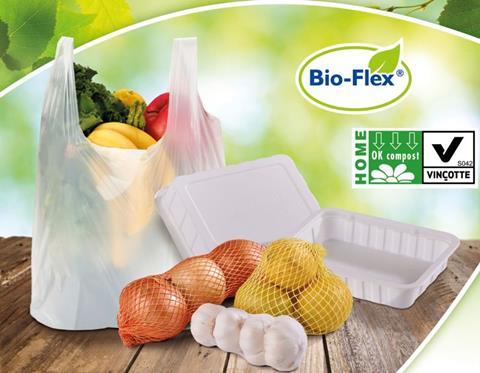
At the interpack 2017 trade fair, FKuR will be presenting numerous newly developed and advanced biopolymer compounds for the resource-efficient production of films as well as for hard and soft packaging. Special film types can be composted, some even in home composters.
At interpack 2017, bioplastics specialist FKuR will be presenting its updated portfolio of biobased thermoplastic compounds for the production of films, profiles and moldings (Booth 9F14 in Hall 9). The focus will be on a number of new products with improved resource-efficiency potential. These comprise of compounds with a higher share of renewable raw materials as well as products with optimized mechanical properties allowing the production of thinner films. Other recent additions to the FKuR range are products certified for home composting. A particular highlight of the FKuR presentation is the new biobased TPE called Terraprene®.
Bio-Flex® FX – for thin biodegradable film with full functionality Complete biodegradability (according to EN 13432) is the prime characteristic of the flexible Bio-Flex® biopolymer compounds offered by FKuR, these also exhibit high strength and toughness.
Major applications of Bio-Flex® FX 1120 include thin-walled bags, in particular bio-waste bags which permit a high retention of moisture, as a result of their higher resistance to water compared with starch-based compounds. With a renewable content of more than 50%, this type meets the requirements of the German ordinance on the use of bio-waste (Bioabfallverordnung).
The new Bio-Flex® compounds of the F 18xx and FX 18xx series are suitable for the production of thin films which are completely biodegradable in garden compost, and are certified by Vinçotte as “OK Compost HOME”. Furthermore, most of these types comply with the requirements of section 75 of the French energy transformation act (Loi sur la transition énergétique). These new compounds also exhibit the high moisture resistance typical for Bio-Flex®, this not only makes them suitable for bio-waste bags but also for other applications such as reusable bags, T-shirt bags for fruit and vegetable counters, mulch films and other packaging. All of the Bio-Flex® types share the benefit of the ease of converting on existing conventional PE extrusion equipment.
Biograde® and Terralene® - higher resource-efficiency in injection and extrusion molding With new biopolymer compounds based on cellulose acetate (Biograde®) or polypropylene (Terralene®), FKuR has widened the options for reducing the use of fossil resources in the production of moldings and extrudates.
For the new Biograde® injection molding compounds C 5509 CL and C 5508, a highly advanced raw material + additive combination is used to increase the share of the biobased content from its previous level of 50% to now more than 65% These grades can be easily processed with short cycle times on standard injection molding machines which have a universal screw and are also suitable for multi-cavity molds.
The Biograde® series of compounds features high stiffness, strength and impact resistance as well as a pleasant surface texture. This makes them particularly suitable for use in injection molded technical parts and articles in daily use. As Biograde® compounds do not contain any hazardous plasticizers, they are also approved for food contact (EN 10/2011 and FDA) and for the production of toys (EN 71-3).
The Terralene® PP grades by FKuR are newly developed polypropylene compounds for injection and extrusion molding applications which are partially based on renewable raw materials. The renewable content of the various types is about 35% and can be clearly demonstrated to the final customer by the 14C method. Their processing and application properties are similar to those of comparable petroleum-based materials.
Terraprene® - biobased elasticity With Terraprene®, FKuR has now extended the window of application of biobased raw materials into the product group of thermoplastic elastomers (TPE-S). Depending on the grade, the share of renewable resources can be as high as 80%. The performance features and resistance of these newly developed biobased types largely correspond to those of their petrochemical counterparts. They are suitable for both injection and extrusion molding. The currently available standard types of Terraprene® cover a wide Shore hardness range from A 20 to D 40. In addition, individual adjustments based on the customer’s requirements are possible. Typical applications include soft touch handles, toys, tools, and sports equipment. Terraprene® is also a sustainable substitute for PVC.
Bioplastics:Bioplastics are a distinct class of materials that consist of renewable raw materials and/or permit biodegradation of the products made from them.
More info:






